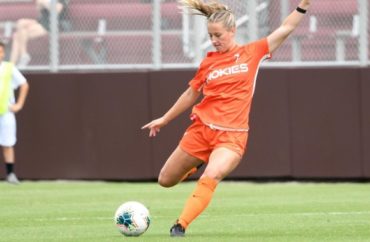
UPDATED
Soccer player objectively played fewer minutes after refusing to kneel for coach’s woke agenda
A Virginia Tech female soccer player who alleged that she lost playing time after refusing to go along with the woke agenda of her coach can continue her First Amendment lawsuit, a judge ruled recently.
Former soccer player Kiersten Hening’s suit against coach Charles “Chugger” Aidair can proceed, federal Judge Thomas Cullen announced on December 2.
Aidair moved to dismiss the lawsuit, but Cullen ruled Hening’s suit could continue.
The issue arose during the fall 2020 season, after the Black Lives Matter riots over the summer ostensibly stemming from the killing of George Floyd at the hands of Minneapolis police officers.
According to the court documents, some members of the soccer team wanted to show support for the BLM movement, while others, including Hening, did not want to back the group and its goals.
Hening (pictured) alleges she lost playing time for refusing to kneel during a “unity statement,” a cause supported by Adair and some members of the team.
Adair also berated Hening, according to the lawsuit. Judge Cullen noted:
Hening, who had been a major on-field contributor for two years prior to the 2020 season, also asserts that Adair removed her from the starting lineup for the next two games and drastically reduced her playing time in those games because she had engaged in this protected First Amendment activity. As a result, Hening resigned from the team after the third game of the season.
Hening objectively played fewer minutes after refusing to kneel for her coach’s woke agenda, although Chugger asserts it was because of her playing ability.
“As a freshman, Hening averaged 76 minutes of playing time; as a sophomore, nearly 88,” the ruling noted. “But during the Clemson game [the game that followed Hening’s refusal], Hening only played 29 minutes, and, at the UNC game, just 5.”
Cullen said the coach may be able to convince a jury that he was within his rights as a coach to make judgment calls and that the benching was not speech retaliation.
“Ultimately, Adair may convince a jury that this coaching decision was based solely on Hening’s poor play during the UVA game, but the court, viewing the evidence in the light most favorable to Hening, cannot reach that conclusion as a matter of law,” Cullen ruled.
Adair also argued that two other players who did not kneel were not subsequently subjected to less playing time.
Cullen wrote in his ruling that there was case law on college student’s free speech rights to allow the lawsuit to continue:
While the U.S. Supreme Court and the Fourth Circuit may not have addressed the novel factual circumstances presented here—i.e., a college coach allegedly retaliating against a player for refusing to kneel with her coaches and teammates in support of perceived unity and social justice—the core constitutional principle is both clearly established and fundamental to a free society, and especially to an institution of higher education.
He then gave examples, such as a ruling “finding that a medical student sufficiently alleged First Amendment retaliation by the UVA Medical School when he was suspended after challenging a speaker about ‘microaggression.’”
The case now proceeds to trial.
Editor’s note: The spelling of Hening’s name has been fixed.
MORE: University of New Haven raises Black Lives Matter flag
IMAGE: Hokiesports.com
Like The College Fix on Facebook / Follow us on Twitter







Please join the conversation about our stories on Facebook, Twitter, Instagram, Reddit, MeWe, Rumble, Gab, Minds and Gettr.